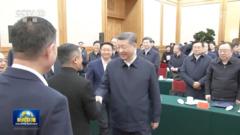The recent appearance of Alibaba's founder, Jack Ma, alongside President Xi Jinping during a crucial symposium has sparked discussions about the future of China's tech sector. After taking a step back from the limelight following critical remarks about China's financial industry in 2020, Ma's presence at this high-profile event marks a significant moment for both him and the broader Chinese economy.
### Jack Ma's Reappearance: A Sign of Shifting Dynamics in China's Tech Landscape

### Jack Ma's Reappearance: A Sign of Shifting Dynamics in China's Tech Landscape
Jack Ma's return to public life signals potential changes in China's tech sector and economy, offering a blend of hope and caution for investors and entrepreneurs alike.
Photos from the symposium show Ma seated prominently, which analysts interpret as a sign of his "rehabilitation" following years of governmental pressure. Bill Bishop, a China analyst, noted that Ma's handshake with Xi, despite him not speaking, suggests that the tech titan may be regaining favor within Beijing's corridors of power. The online response has been largely positive, with many on Chinese social media heralding Ma's return as a boost to China's struggling economy.
Stock market reactions reflect this optimism, especially for Alibaba, whose shares surged over 8% following the event. The company reported impressive financial results that exceeded market expectations, contributing to a stark 60% rise in its share value so far this year.
Ma's withdrawal came after he criticized the "pawn-shop mentality" of state-owned banks, which led to his company, Ant Group, facing significant regulatory backlash, including the cancellation of a massive stock market flotation. With Ma's reemergence, there is speculation that this might indicate a relaxation of the stringent policies imposed during the tech crackdown that followed his criticism.
President Xi's address during the event emphasized the need for private enterprises to "innovate, grow, and remain confident," signaling a potential shift in the government's approach to its tech sector. Analysts like Richard Windsor are hopeful that this indicates a new era where the private sector can operate with greater autonomy, moving past the stagnation caused by strict regulatory controls.
China's broader economic challenges include a slowdown in growth and high unemployment rates among the youth, which have fueled the urgency for a revitalized private sector. This symposium featured key representatives from various industries, highlighting the government's apparent pivot toward leveraging the innovative potential of private tech firms.
The rise of China's DeepSeek AI model, which has gained international acclaim and sparked national pride, further supports the notion that the country is poised to embrace advanced technologies. However, observers note that the backdrop of international geopolitical challenges, particularly with the U.S., may necessitate a recalibration of China's economic strategies.
In conclusion, while Ma's return symbolizes a glimmer of hope for the tech industry, it also reflects a careful balancing act by Beijing. Analysts warn that this does not equate to a full return to the unregulated growth of the past but suggests a move towards a model of controlled participation where the private sector must align with national priorities. The future of China's economy appears to hinge on this delicate interplay between innovation and regulation.
Stock market reactions reflect this optimism, especially for Alibaba, whose shares surged over 8% following the event. The company reported impressive financial results that exceeded market expectations, contributing to a stark 60% rise in its share value so far this year.
Ma's withdrawal came after he criticized the "pawn-shop mentality" of state-owned banks, which led to his company, Ant Group, facing significant regulatory backlash, including the cancellation of a massive stock market flotation. With Ma's reemergence, there is speculation that this might indicate a relaxation of the stringent policies imposed during the tech crackdown that followed his criticism.
President Xi's address during the event emphasized the need for private enterprises to "innovate, grow, and remain confident," signaling a potential shift in the government's approach to its tech sector. Analysts like Richard Windsor are hopeful that this indicates a new era where the private sector can operate with greater autonomy, moving past the stagnation caused by strict regulatory controls.
China's broader economic challenges include a slowdown in growth and high unemployment rates among the youth, which have fueled the urgency for a revitalized private sector. This symposium featured key representatives from various industries, highlighting the government's apparent pivot toward leveraging the innovative potential of private tech firms.
The rise of China's DeepSeek AI model, which has gained international acclaim and sparked national pride, further supports the notion that the country is poised to embrace advanced technologies. However, observers note that the backdrop of international geopolitical challenges, particularly with the U.S., may necessitate a recalibration of China's economic strategies.
In conclusion, while Ma's return symbolizes a glimmer of hope for the tech industry, it also reflects a careful balancing act by Beijing. Analysts warn that this does not equate to a full return to the unregulated growth of the past but suggests a move towards a model of controlled participation where the private sector must align with national priorities. The future of China's economy appears to hinge on this delicate interplay between innovation and regulation.



















